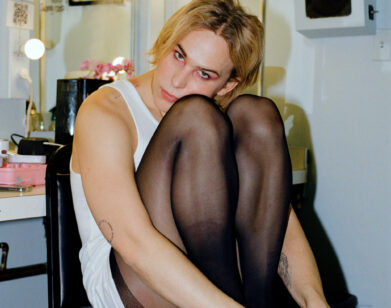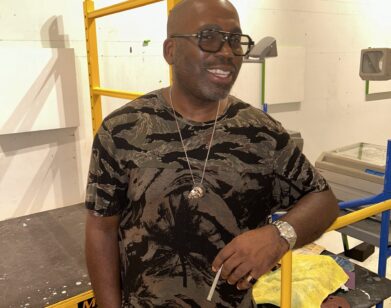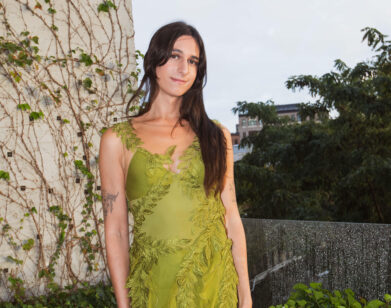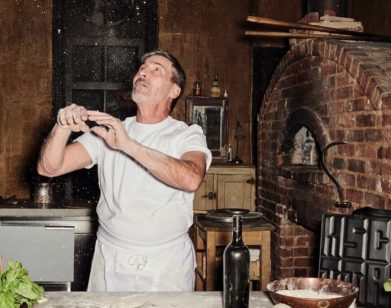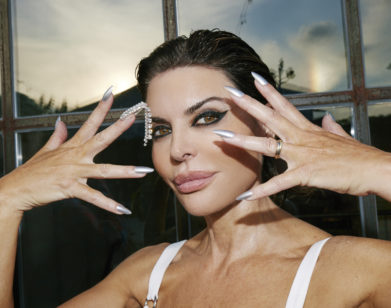How Condola Rashad Is Feeding New Yorkers Through Her Music
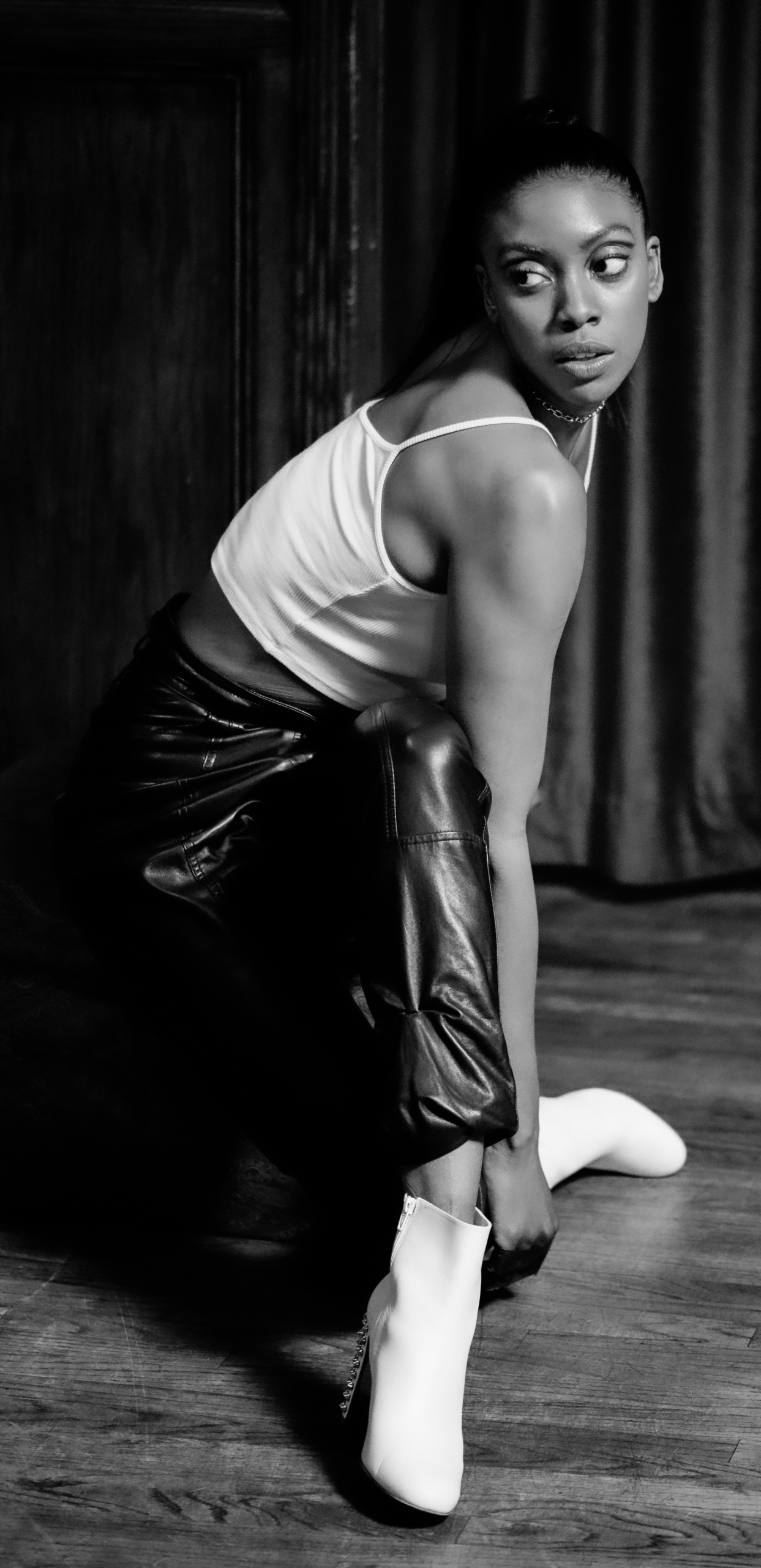
Photo courtesy of Condola Rashad.
It’s hard to leave a conversation with Condola Rashad in a bad mood. Despite the grave nature of the characters she’s best known for playing—ruthless criminal attorney Kate Sacker in Billions, a bloodstained Joan of Arc in Broadway’s Saint Joan— the Brooklyn-based actor and musician’s emotive voice and general ebullience, even in the midst of a quarantine, is enough to un-tense the trapezius.
Rashad’s magnetism doesn’t just stem from her disposition: a deep sense of conviction pervades her every artistic decision. Take, for example, her visual EP Space Daughter (out later this year), which she wrote, funded, directed and produced mostly on her own. With its release, the Tony-nominated actress and classically trained pianist makes her first public foray into the music industry. “I knew no label would let me do this the way I wanted,” she says. “I was like ‘No thanks.’ Fresh out of the gate, I need to be able to present myself exactly as I am.” The EP, a multi-sensory collection of soulful power ballads paired with richly saturated music videos, shows the range of Rashad’s influences while making clear that, in her world, gesture, color and sound are relentlessly intertwined. In “Blue,” she reclines on a flower-laden jungle throne before slowly submerging herself in a rocky pool. In “Running in Place,” out today, she spirals through a wine-stained, tightly choreographed period drama.
In response to the pandemic, Rashad has pledged to donate the proceeds from each Space Daughter track to a New York City community organization, “Blue” is tied to the Food Bank for New York, and proceeds from April’s “Give Up The Gold” support Hearts of Gold, an organization that aids homeless mothers. “This project is a celebration of the Divine Feminine in all its forms,” she says, “that means it should support people.”
Despite the unprecedented changes of recent months, Rashad has not only managed to stay the course, but make Space Daughter a source of relief for countless vulnerable New Yorkers. To celebrate the release of “Running In Place,” we asked Rashad to guide us through her creative process, from decoding her old journal entries to laying off the matcha lattes.
———
MARA VEITCH: Are you in New York?
CONDOLA RASHAD: I am. I’m in Brooklyn. Things seem to be moving in a calmer direction, but very slowly.
VEITCH: If the world were still normal, what might your upcoming album release have looked like?
RASHAD: Honestly, what’s interesting is that not much changed. We were always planning the release this way, with singles tied to video drops. When everything started to intensify, I think the whole industry was like “Okay, great, we’re just postpone it a month. It’s fine.”
VEITCH: It’s amazing that we all earnestly believed that.
RASHAD: I know. But this has never happened to us before, and I think it’s in our nature to try and plan around a crisis. So I just was sitting with all of it, in my living room on this really gray day, with my team on the phone telling me to postpone. At first, I was like, “Okay, sure. This is what’s happening, we got to just go with the flow.” But then I was like, “Wait a minute. In terms of this project, what exactly is the flow?” Over the last year and a half, I mustered all of the energy and all of the light that I have and I put it into this project. All the videos are finished, the tracks are polished, it’s all ready to go. I just realized that, in this crisis there’s so little I can actually do for others. This project is what I have to offer.
VEITCH: So you decided to stay the course.
RASHAD: Yeah. As an artist in a shadow time, this is the light that I have. And however you receive it—if you get one song that you like out of it, or the videos bring you joy, then fantastic.
VEITCH: The typical instinct in the entertainment industry seems to be to structure a release around when it can do the most for its creators. It sounds like you wanted this album to do the most for the people listening to it.
RASHAD: I got chills just now because that is exactly it. It felt so weird, in the midst of everything, to be trying to reschedule a strategically beneficial album release.
VEITCH: How did you decide to connect the album to community organizations?
RASHAD: Here in New York, low income and homeless people have hit particularly hard by the virus. Once I decided not to reschedule the release, I just wanted to figure out how to make this album actually helpful to people. I connected with Food Bank for New York City, and basically just pledged my personal proceeds from “Blue” to them indefinitely. Of course, there are other artists involved in the songs, and people who supported the project who need the money, but I did what I could do. So basically, even beyond this crisis, by downloading the song, you are actually helping the food bank.
VEITCH: How did you approach the release of last month’s “Give Up the Gold?”
RASHAD: The release was on April 31st, and May is the month of Mother’s Day, so I decided that the track should belong to women. I just stumbled on an organization called Hearts of Gold, which helps homeless mothers build confidence as they transition out of the shelter system. It just made sense.
VEITCH: So, everything has come together very naturally.
RASHAD: Yeah, and that’s how the whole project has been, everything has just flowed. I feel like I’m just a facilitator, I’m just facilitating this.
VEITCH: Tell me about the visual aspects of the album. Is there a story that’s being told through the videos?
RASHAD: Firstly, color was a big part of the project. I’m very visual, I get a lot of inspiration from colors. My co-producer, who I love, understood “Condolish”—it’s how I talk when I’m in the middle of a creative process. I’ll be like, “no, this is giving me periwinkle and light blue right now and I need it to sound dark navy.
VEITCH: He speaks your colors.
RASHAD: Yeah. As for the concept of the videos, before I made the music I found this journal entry from 2018 of mine that just said “Space Daughter.” I was like, what on earth is Space Daughter? Is that my name as an artist? Is that the project? I just didn’t know.
VEITCH: It was a mystery.
RASHAD: It was. But one of my mother’s nicknames for me when I was young was actually Space Child. I was always dreaming stuff up, totally spaced out. So Space Daughter became a beautiful connection. After I created the music, I sat with it and decided it had to be a music video series. Visually I wanted to really hone in on the Divine Feminine. It comes through Space Daughter, who you see at the beginning of every video, dressed in white.
VEITCH: You decided to self-fund, co-produce, write, and direct this project. What made you want to manage Space Daughter so closely?
RASHAD: I trained as a classical musician for 10 years before I ever stood on a stage, but my acting career took off very naturally as soon as I finished college. So for a long time, nobody really knew that I ‘m actually a musician. I made this album independently because I knew at this stage, viewers didn’t see me as a musician, and it going to be challenging to convince people to invest in me. No label was going to let me do it the way I wanted to do it. I was like nah, fresh out the gate, I want to be able to present myself as I am.
VEITCH: Does this vision and sense of conviction translate into your acting as well?
RASHAD: In a different way, but it absolutely does. Every time I play a role, I try to embody it fully no matter how large or small a project it is. But so far in my acting, there are always parameters that have already been set. It’s already been written, there’s a director, and I navigate within that. When I did Saint Joan on Broadway, which changed my life, it required so much discipline to hold that character every day. But in that role, I just decided to go as far as I possibly could. I went HAM on Joan of Arc. I studied her every step, because this was a real woman, and I wanted to honor that. But this project is different because it all came from me.
VEITCH: You exude so much energy. I can’t imagine how you’re handling quarantine.
RASHAD: [Laughs] I swear, I had to stop drinking my matcha lattes because it was too much energy. So if this is me without the matcha, just imagine. But I’m actually really fortunate, because my apartment is filled with light. So I’m good. That’s all I need.

